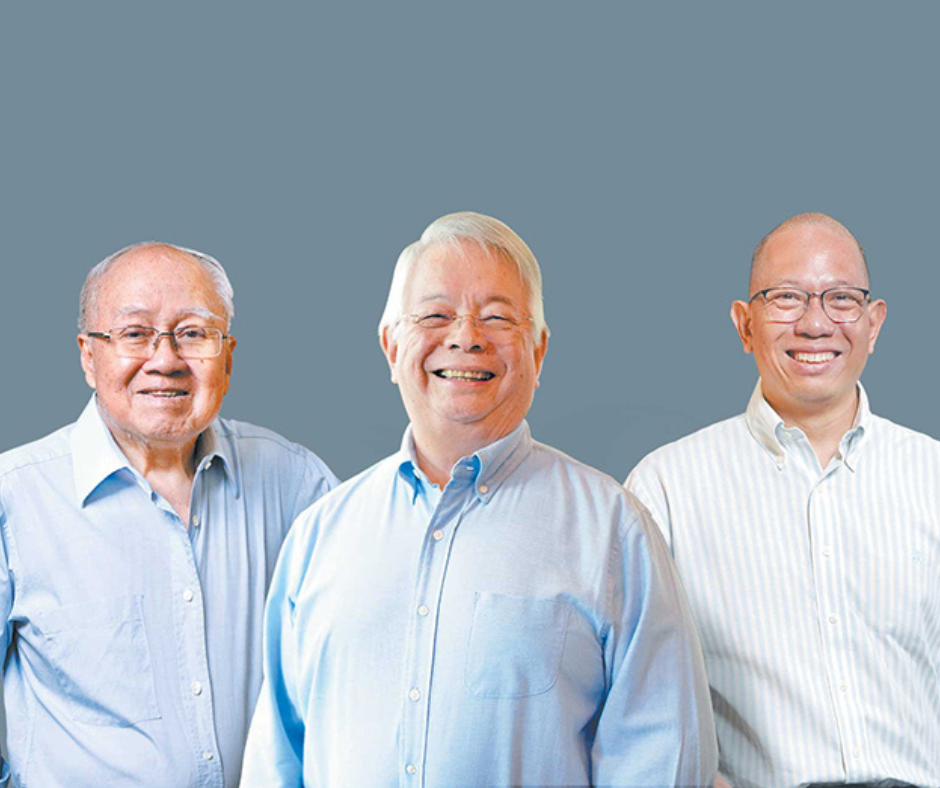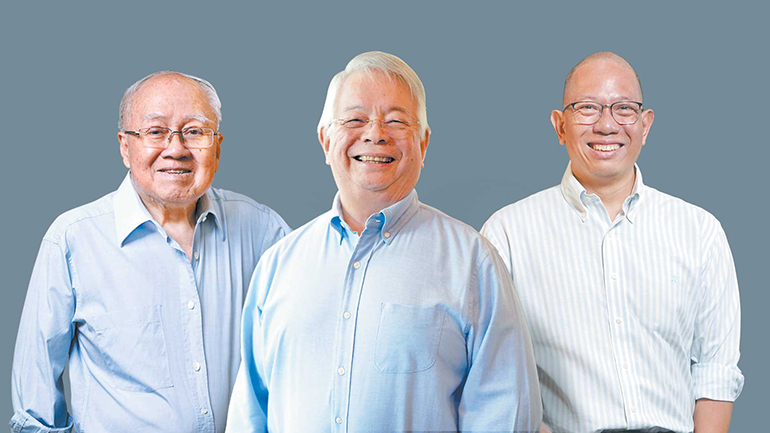Treading the often-difficult path of making lives better

As published on BusinessWorld, 7 February 2023

Former US President Franklin D. Roosevelt was once quoted as saying, “Competition has been shown to be useful up to a certain point and no further, but cooperation, which is the thing we must strive for today, begins where competition leaves off.”
Indeed, in almost all things, a single person can do and achieve much less than a group working together towards a single goal. This is the foundation that patriotism is built on — countrymen supporting one another to make their nation the best it can be.
This idea is what guided Amb. Ramon V. del Rosario, Sr. (RVR), Don Filemon C. Rodriguez, and Ernesto O. Escaler in creating PHINMA Corp. A few years after the devastation of the second World War, PHINMA was established at a critical time in Philippine history, when a nationwide rebuilding effort was in motion and foreign nationals ran most of the big businesses in the country.
“PHINMA started about a decade after the end of the second World War. And I think it was motivated by what I would call nationalistic objectives,” Ramon R. del Rosario, Jr., chairman and CEO of PHINMA Corp., said in an interview.
“My father had two things in mind: One was to help rebuild the Philippine economy, and the second was to show that Filipino managers are as good as any in the world. Those were two strong motivations for him.”
Mr. Oscar J. Hilado, the company’s current chairman emeritus, was the late Amb. del Rosario’s longtime assistant and partner in leading PHINMA. He recalled, “[RVR] and [Mr.] Rodriguez had established PHINMA as a company that was going to be a Filipino company. That’s why they got Filipinos to run the company. They had outstanding Filipino managers, but they were very much ‘Filipino’ more than just managers. They wanted to put the Filipinos first. This was passed down to me, this kind of outlook.”
PHINMA first made its name in the cement business, helping rebuild the country from where it was after the war. The company met considerable success until the 1990s with the Asian Financial Crisis, when “the roof fell on our heads,” as Mr. del Rosario put it.
The situation eventually led to PHINMA’s decision to sell off its cement business and rethink what it can do to help make the Philippines competitive with the rest of the world.
“We concluded that it is our people, and if we want our people to be competitive, one of the things we should do is help develop the human capital of our country. Therefore, we considered going into education. Education, particularly, that is accessible to the wider broader market.”
Since then, education has been one of PHINMA Corp.’s key businesses, alongside other investments into hospitality, property development, and a return to construction materials.
Serving a core purpose
Mr. Hilado, who had served the company during those early turbulent years, said that PHINMA had never been more dedicated to its mission of “making lives better” than it is now.
“I must confess, there was not very much time to think about what were the advocacies we were advocating. By contrast, PHINMA today is very clear-minded about what it wants to do, about making lives better. Ramon Jr. has structured the directions of PHINMA better than RVR and I did in all those years.”
Mr. del Rosario emphasized their company’s commitment to their original purpose of becoming a force for good for the Philippines. PHINMA Education, he cited as example, served mostly an underserved market, consisting of families without any prior experience with tertiary education, those who more often than not cannot pay tuition upfront.
“That market is subject to a lot of uncertainties,” he said. “Kids who come to our schools are products of public schools; and, sad to say, almost all of them are not ready to enter college.”
“Right there we have to make a decision whether we will take them in or whether we will turn them away. But clearly in our minds, if we turn them away, these kids will never have a chance at a better life. They will be forever poor,” he continued.
“So, we made it part of our mission to work with these kids. We do not turn away anyone. We accept everyone who wants to come to our schools and even help them afford our tuition.”
PHINMA Education does this by offering a variety of programs to help students go to school, and more importantly, stay in school. Such programs include scholarships, helping students build self-confidence, demonstrating the value of education, connecting students with successful role models who came from similar backgrounds, and even offering constant guidance through house calls.
The results speak for themselves, Mr. del Rosario pointed out. He said that their board exam results across fields like nursing to criminology, had an average of 80% pre-pandemic, even in licensure tests with a low overall passing rate.
Even in the pandemic years, when education in general took a hit, this rate stayed around 70%. They even saw an uptick in their enrolment figures during the period, boosting their student population to 124,000 last year and making PHINMA Education the largest education network in the country.
“PHINMA was set up with the intention to do good for the country. Even at the very outset, the intent of the company was to help build the country. It was out of love for the Philippines,” said Chito B. Salazar, Jr., president and COO, head of education of PHINMA Corp. and president and CEO of PHINMA Education.
The PHINMA spirit
Dr. Salazar noted that while the initial business of PHINMA has changed, the spirit remains the same.
“I think this is what should drive business. Part of the difficulties in our world is because you always see businesses’ main role is to make a profit, which is important of course. But I don’t think making a profit is the first objective of business. I think any entity, any organization, any person’s first role in life is to somehow make the world a better place by their presence,” he said.
“Profit allows business to continue to do this in a sustainable way. You don’t need to ask for money from the government, you don’t need to rely on donations. It generates a profit in the process of doing good, and then it can sustain doing good. But, the first objective is always to make the world a better place.”
For Mr. Hilado, much of the success of PHINMA in doing good while doing well is thanks to the people who are dedicated to this mission of making lives better.
“Every employee and stakeholder of our company is called to be good at what they do—even better than good, as we strive for excellence at all times.,” he said.
“I am an advocate for a strong balance sheet and a good dividend policy. PHINMA is fair at all times—with associates, employees, customers, suppliers, and even our competitors. We are always honest, even while being fiercely competitive,” he added.
PHINMA employs this philosophy in all its businesses: in pursuing property development to provide affordable housing to Filipinos through PHINMA Properties; aiding national development by providing construction materials through PHINMA Construction Materials; and providing comfortable and safe stays for business travelers and tourists through PHINMA Hospitality.
Dr. Salazar is hopeful for the future of PHINMA, and looks forward to bringing the PHINMA spirit to other industries.
“The beauty of having a business driven with a mission of making the world a better place is that there will always be problems to solve. You won’t run out of things to do…Even though poverty and inequality still exist, there are new calls. One of the biggest is the environment. As we move forward, we’re now looking at new businesses and new ways to continue to help the world,” he said.
“I will admit that businesses—no one business in particular—have been responsible for many of the ills of the world. But this power can also be used in the opposite direction… It’s a good thing we have a very clear north star, precisely what are the essentials for living a dignified life for Filipino families?” he continued.
The executives also expressed their confidence that PHINMA Corp. will maintain its altruistic spirit as it moves into other businesses.
“As long as you believe in what you’re doing, I think you have a good shot at it,” Mr. del Rosario said.
“I have never been more optimistic about PHINMA’s future as I am now. I sit back now and say, ‘Wow, those guys are going to run with this company. They know what they’re doing, and I like what they’re doing,’” Mr. Hilado added.